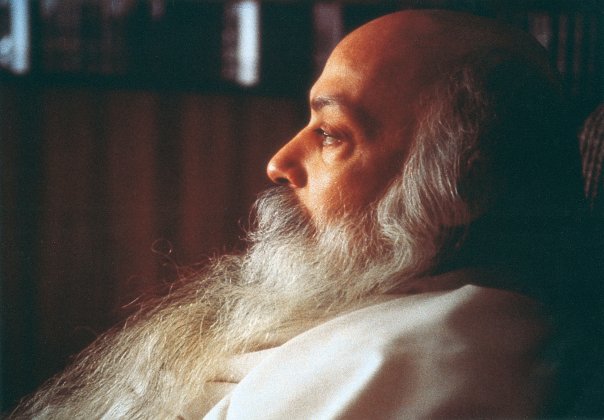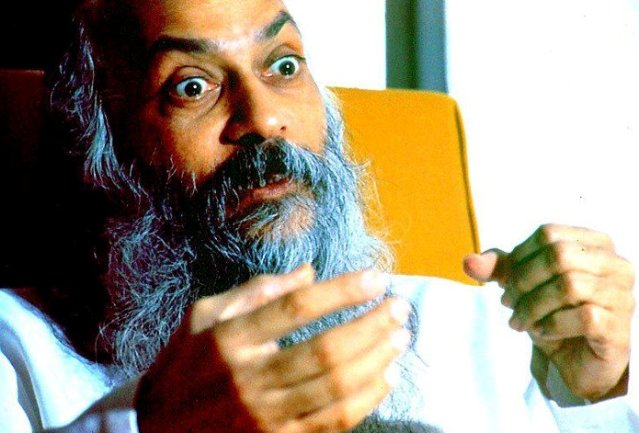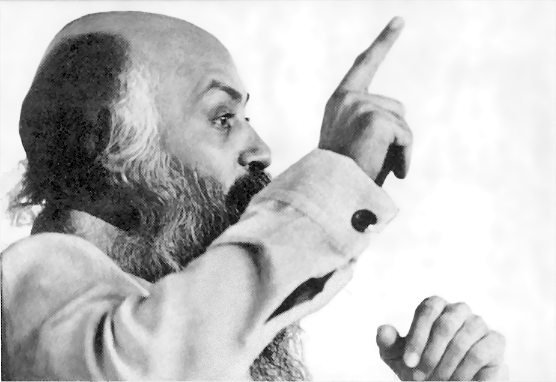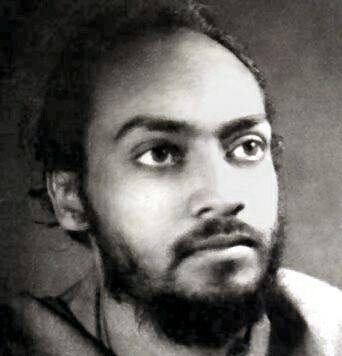Osho Quotes on Attachment
- Attachment is the root cause of all misery. Possessiveness is nourishment for the ego.
- Misery is nothing but the shadow of attachment. And hence all stagnancy. The attached person becomes a stagnant pool — sooner or later he will stink. He flows no more.
- It is your attachment that creates hell.
- Attachment brings misery, unattachment brings blissfulness. So use things, but don’t be used by them. Live life but don’t be lived by it. Possess things, but don’t be possessed by them. Have things — that’s not a problem. I am not for renunciation. Enjoy everything that life gives, but always remain free.
- Attachment means clinging to something, wanting it the way it is forever. That is asking for the impossible. The young person wants to remain young forever, and that is impossible, sooner or later he has to become old. But then old age, rather than bringing joy, brings suffering. Otherwise old age should be the very crescendo of life. It should be the highest peak, snow-covered — but it is a dark hole. It is a dark hole because we have been clinging to youth. We cling to the body, but the body has to go one day. Live in it, love it, respect it, take care of it, but don’t become attached. Remember it is a caravanserai, an overnight’s stay. But in the morning we have to go.
- REMEMBER remain alert that you don’t get too much attached to the accidental — and all is accidental except your consciousness. Except your awareness, all is accidental. Pain and pleasure, success and failure, fame and defamation — all is accidental. Only your witnessing consciousness is essential. Stick to it! Get more and more rooted in it. And don’t spread your attachment to worldly things.
- A witnessing consciousness lives in life but with tremendous non-attachment, with great non-possessiveness; it possesses nothing. It lives totally, it lives passionately, but still knowing that “I don’t possess anything.”
- Attachment is not love. Where there is attachment there is exploitation.
- Attachment is the shadow of the ego. Attachments are immediately created wherever you see ‘I am’.
- As long as the “I” is there, love cannot be. All that we call love is only desire, longing, passion and attachment; as long as ego is there, all these bind one.
- You can change your attachment from this to that, but you will be in misery. Attachment creates misery.
- To live a life of attachment is very destructive because whomsoever you think you love you reduce to a thing. And you allow yourself also to be reduced to a thing. It is good to be a man, it is not good to be a husband. A husband is a thing and an ugly thing at that; the very word is ugly. It is good to be a woman but not good to be a wife. Being a wife means you are reduced to a very small relationship. The woman was vast; the wife is tethered, chained, imprisoned. And that’s what love goes on doing. People do it to their children — they possess them. Children are nobody’s possession; they come through the parents but they don’t belong to them. But people behave as if they are the owners: ‘my child, my wife, my husband.’ The very idea of putting your ego projection on the other is destructive of love. The word ‘mamta’ literally means mine — literally. ‘Mam’ means my, mamta means mine. The moment you say my, mine, you have projected the I, the ego has come into functioning and the ego is the enemy of love. My sannyasins have to learn the ways of non-attachment, non-possessiveness, only then does love blossom. And the blossoming of love is religion, true religion. When your heart is fragrant with love you know what god is. The taste of love gives you the proof that god exists, there is no other proof; except for love there is no other proof for god. There has never been and there never will be; love is the only proof, the only proof. But people are destroying the very possibility of their knowing god by destroying love.
- Remember, if your nonattachment to things is true, has come out of understanding, has grown out of awareness, you will become more loving. Because the same energy that was involved in attachment will be released. Where will it go? You will have more energy at your disposal. Attachment is not love. It is an ego trip — to possess, to dominate, to manipulate. It is violence; it is not love. When this energy is relieved, suddenly you have much more energy with which to love. A really nonattached person is full of love, and always and always he has more and more to give, and always he goes on finding new sources of love. His source is infinite.
- When Patanjali says “non-attachment”, he is not anti-love. Really, he is for love. Non-attachment means be natural, loving, flowing, but don’t get obsessed and addicted. Addiction is the problem. Then it is like a disease. You cannot love anybody except your child — this is addiction. Then you will be in misery. Your child can die; then there is no possibility for your love to flow. Even if your child is not going to die, he will grow. And the more he grows, the more he will become independent. And then there will be pain. Every mother suffers, every father suffers.
- You fall in love with a person, you become attached, and immediately misery starts. You become possessive, you are afraid he may fall in love with somebody else. You start hindering, obstructing his freedom, you start reducing him to a thing. All respect and love starts disappearing. It becomes only a continuous fight between two egos. You want to possess him and he wants to possess you. How can love exist in such a constant war? Attachment destroys love. It is poison to love. Love deeply, profoundly, but don’t bring possessiveness and jealousy in. They are bound to come in if you become attached. The greatest art to learn in life is to float unattached. Pass through life but be untouched by anything. Things will come and go, you remain centered in your being, undistracted, undisturbed. That’s what sannyas is. And if a person can manage this state all bliss is his. He can have the whole universe. This is a miracle: the universe belongs to those people who are non-possessive. Love belongs to those who are non-jealous.
- You get frustrated because of your demands. You were thinking that when you will come back home, your wife will be just standing outside to welcome you. And if she is not standing there outside to welcome you, you cannot accept it. And this gives you frustration and misery. You demand, and through demand you create misery. And demand is possible only if you are attached. You cannot demand with persons who are strangers to you. Only with attachment demand comes in. That is why all attachments become hellish. Patanjali says be non-attached. That means be flowing, accepting, whatsoever life brings. Don’t demand and don’t force. Life is not going to follow you. You cannot force life to be according to you. It is better to flow with the river rather than pushing it. Just flow with it! Much happiness becomes possible. There is already much happiness all around you, but you cannot see it because of your wrong fixations.
- If attachment is the conditioning factor, then non-attachment will become the unconditioning factor. If expectation leads you in misery, then non-expectation will lead you into non-misery. If anger creates a hell within you, then compassion will create a heaven. So whatsoever the process of misery, the reverse will be the process of happiness. Unconditioning means you have to understand the whole knotted phenomenon of human consciousness as it is.
- Become alert about desire and non-attachment begins to appear. This is not to be made to happen, it follows naturally from awareness of attachment. Each one of us has to become aware of his attachments, and keep being so! Nothing should be done unconsciously.
- Attachment is the root cause of all misery — and our mind is such that it starts clinging to each and everything. It starts becoming identified, attached, it does not know how to keep a distance; hence the misery.
- Identification with the body, with the mind, with our possessions, with our families, with our friends — any kind of identification takes you outwards. All your possessions will be outwards: your wife, your husband, your children, your body — your body is outside you; your mind — your mind is outside you. The only thing that is not outside you is the witnessing. Just the watchfulness — that is your buddha. Identification means losing witnessing, falling into the trap of attachment. That is our misery, that is our slavery.
- Become detached from your ego, become detached from your possessions. Become simply detached from every possible source of attachment.
- To remain attached to the temporal, to the changing is to remain within the world of misery because the temporal will be taken away. You have invested so much in it but one day everything is taken away. Then it is natural to feel miserable. Misery is rooted in attachment to the body and bliss is rooted in non-attachment to the body; hence all the great masters have been teaching methods and means of non-attachment, of getting disidentified with the body, with the mind, with everything surrounds you, and of just remaining a pure witness. That’s what we are: pure witnessing, pure awareness.
- If someone else is saying, “This world is futile,” this conclusion cannot become your conclusion. You will have to pass through experience, fully aware. Whenever you feel desire, move into desire fully aware and when you reach the fulfillment of the desire, know well what has happened — whether any hope has been fulfilled or just frustrated. Go on moving in desire, alert, and then you will come to understand that all desire is futile, all attachment is meaningless; it creates misery, it never creates any bliss. Vairagya means this conclusion reached through awareness, reached through experiencing — and knowing is the fruit of vairagya, of non-attachment.
- Misery comes out of attachment. When your attachments are not fulfilled as you wanted them to be, when your expectations are not fulfilled, frustration arises. Frustration is a by-product. If you don’t expect, nobody can frustrate you. If you don’t want to make a home here, even death cannot frighten you. Nothing can frighten you. If you don’t cling to anything, how can you be made miserable? Your clinging creates misery, because you want to cling and in the very nature of things, things are changing; you cannot cling. They are slipping constantly out of your hands. There is no way to cling to them.
- Your ego may be just a soap bubble. Maybe for a few seconds it will remain, rising higher in the air. Perhaps for a few seconds it may have a rainbow, but it is only for a few seconds. In this infinite and eternal existence your egos go on bursting every moment. It is better not to have any attachment with soap bubbles.
- Everything comes out of nothingness and goes back into nothingness. Hence there is no need for attachment, because attachment will bring misery. Soon it will be gone. The flower that has blossomed in the morning, by the evening will be gone. Don’t get attached; otherwise in the evening there will be misery. Then there will be tears, then you will miss the flower. Enjoy while it is. But remember, it has come out of nothing, and it will go back to nothing. And the same is true about everything, even about people.
- When you are not the doer how can the attachment happen? You do a small thing and you become attached. You say, “I have done this.” You would like everybody to know that you have done this and you have done that. This ego is the barrier for the supreme understanding. Drop the doer and let things happen. That’s what Tilopa means by being loose and natural.
- The only problem in life is love. Either people are missing love — then their life is empty, then their life has no meaning, no significance, no joy — or people are full of love but their love is contaminated by attachment. Again they become miserable;t again, anguish arises, because that attachment, that clinging creates possessiveness, jealousy, poisons love completely. It is like a garden which is full of weeds and you are trying to grow roses in it. If your mind is full of jealousy, possessiveness, domination, ego trips and all those numbers, then you cannot grow roses of love. The whole soil is being exploited by the weeds — and weeds are cunning people, very cunning people!
- Transcendence means going beyond duality. Attachment means remaining within duality.
- If you look to me as a person you will become attached, and attachment brings misery. If you look to me as love you cannot be attached, and if you look at me as love you can dissolve with me. You cannot dissolve with a person; you can dissolve only with an energy, not with a person. Persons collide: that is the misery of all the lovers in the world. Persons collide, because persons are two egos. When two egos come close, sooner or later, the clash, the conflict, because each wants to possess the other, and the other cannot like it. Nobody wants to be possessed. So the natural calamity of love arises because you have not understood love as energy. Don’t think of me as a person, otherwise you will start possessing me, and then there will be inner conflict. Think of me as love, as energy, as space; then you can dissolve in me, and you can allow me to dissolve in you. Then there will be no clash.
- Attachment is misery, but from the very beginning the child is taught for attachment. The mother will say to the child, “Love me; I am your mother.” The father will say, “Love me; I am your father” — as if someone is a father or a mother so he becomes automatically lovable.
- If you get attached, then it becomes an obsession. If the person is not there, you are unhappy. If you miss the person, you are in misery. And attachment is such a disease that if the person is not there you are in misery, and if the person is there you are indifferent. Then it is okay; it is taken for granted. If the person is there it is okay — no more than that. If the person is not there, then you are in misery. This is attachment.



